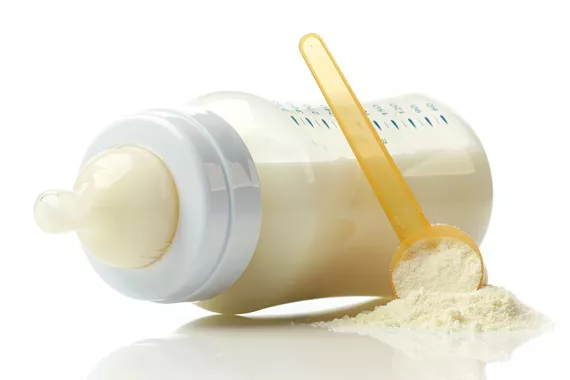
Case Overview
Parents of premature infants are filing Similac lawsuits against Abbott Laboratories. They allege the company failed to warn of important risks — most notably, necrotizing enterocolitis — associated with its cow’s milk-based baby formula. If your premature baby has been diagnosed with NEC after being fed Similac, you may be able to file a lawsuit.
Important NEC Similac lawsuit updates
- February 2025: There were 648 pending actions in federal multidistrict litigation (MDL) against baby formula manufacturers Abbott Nutrition and Mead Johnson & Company.
- August 2024: Four federal bellwether trials were set for 2025. Bellwether trials are a small consolidation of lawsuits that can help predict outcomes for plaintiffs and defendants.
- July 2024: A jury awarded $495 million in damages to the family of a premature infant who suffered from necrotizing enterocolitis after consuming Similac baby formula.
Key takeaways about Similac lawsuits
- Necrotizing enterocolitis is a life-threatening health condition that inflames intestinal tissue, causing the tissue to die. The death rate for babies diagnosed with NEC is as high as 50%.
- Parents of children are suing Abbott Laboratories, alleging that their premature babies developed necrotizing enterocolitis (NEC) after consuming Similac baby formula.
- Hundreds of cases have been filed in multidistrict litigation (MDL). The MDL involves claims against the manufacturers of Similac and Enfamil.
Why are people filing Similac lawsuits?
Parents of children who consumed Similac baby formula are suing Abbott Laboratories after their babies developed necrotizing enterocolitis (NEC). NEC is a gastrointestinal illness that can lead to lifelong health complications or death. Plaintiffs contend that the manufacturer didn’t adequately warn parents or doctors about the risk of NEC for premature babies who are fed their cow milk-based formulas.
There are more than 600 pending actions in federal multidistrict litigation (MDL). Numerous lawsuits have also been filed at the state level against premature baby formula manufacturers of Similac and Enfamil.
What are the NEC Similac lawsuit allegations?
Parents allege in their baby formula lawsuits that manufacturers Abbott Laboratories and Mead Johnson & Company didn’t warn them or their healthcare providers that premature infants are at an increased risk of developing necrotizing enterocolitis (NEC). NEC is a life-threatening condition that can cause intestinal tissue to die. It can also create a hole in the intestine, which may lead to serious infections.
Abbott and Mead manufacture several baby formula products. However, the cow milk-based baby formula at the center of the lawsuits is marketed for premature infants. Necrotizing enterocolitis mostly affects premature babies.
Are other companies involved in the NEC baby formula litigation?
In addition to Abbott Laboratories, Mead Johnson & Company is named as a plaintiff in the NEC baby formula litigation in federal court. Mead Johnson (which was acquired by Reckitt Benckiser Group plc in June 2017) manufactures the baby formula Enfamil.
Both Abbott and Mead Johnson manufacture multiple products across their Similac and Enfamil brands. Parents are seeking compensation after the baby formula makers failed to warn them about the alleged risk of NEC to premature babies who were fed their cow milk-based formulas.
What is NEC?
NEC, or necrotizing enterocolitis, is a health condition that inflames intestinal tissue, causing the tissue to die. Nearly 90% of babies diagnosed with NEC are born prematurely (before the 37th week of pregnancy). NEC can also leave a hole in a baby’s intestine, potentially allowing bacteria to leak into the abdomen or bloodstream.
The death rate for babies diagnosed with NEC is as high as 50%.
The intestines are part of a person’s digestive system. The small and large intestines help the body turn food and liquids into waste. Researchers don’t fully understand what causes NEC. However, studies show that babies not fed human breast milk are more likely to develop NEC. Premature infants often have a weaker immune system and immature digestive system that can be more susceptible to NEC.
Common symptoms of NEC include:
- Bloody diarrhea
- Changes in blood pressure, heart rate, breathing and body temperature
- Green or yellow vomit
- Lethargy
- Pain in the abdomen
- Refusal to eat and inability to gain weight
- Swelling of the abdomen
Can baby formula increase the risk of NEC?
Drinking baby formula made from cow’s milk may increase an infant’s risk of developing NEC. In 1998, an outbreak of necrotizing enterocolitis at a hospital was linked to a contaminant, Enterobacter sakazakii — now known as Cronobacter sakazakii — found in powdered milk. Twelve patients in the neonatal intensive care unit were infected and developed NEC. Two premature infants died.
Cow’s milk-based formulas are harder for premature babies to digest than breast milk. This digestion difficulty may make infants more prone to bacterial infections in the intestines. Premature babies may have a hard time fighting an infection.
A 2022 study published in Frontiers in Pediatrics took a closer look at the effect of infant milk formulas and the risk for developing NEC-like gut injuries in mice. Among the infant milk formulas researchers used in the study was Similac Special Care, which is designed for premature infants and low birthweight infants.
Researchers found that feeding newborn mice the formula milk led to intestinal inflammation and significantly altered gut microbial composition, compared to mice fed by their mothers. Gut microbiome plays an important role in how well a body’s immune system responds.
Complications from NEC can be serious and life-threatening. An infant diagnosed with NEC may be at risk for:
- An abdominal infection (peritonitis) that stems from a hole developed in the intestine
- Intestinal stricture, or narrowing of the large intestine, that can make it difficult for food to pass through
- Short bowel (short gut) syndrome that destroys or damages part of the small intestine, making it hard for a baby to absorb nutrients and leading to malnutrition
- Growth failure and developmental delays, especially in infants who require surgery
Blood tests, fecal tests and X-rays are typically used to diagnose NEC. X-rays can show signs of gas bubbles around the intestine.
Is there a Similac class action lawsuit?
There are no pending class action lawsuits against Similac’s manufacturer — Abbott Laboratories — that involve claims of harm after infants consumed the formula. However, many Abbott complaints are currently part of an MDL.
Multidistrict litigation (MDL) is a court procedure used to streamline multiple individual cases. An MDL is similar to a class action lawsuit because both allow multiple plaintiffs with similar claims to consolidate their cases.
However, the purpose of an MDL is to centralize lawsuits that are from different districts but share common factual issues. The goal is to streamline pretrial processes so case duplication and conflicting rulings can be avoided.
In May 2020, MDL No. 3026 was established in the U.S. District Court for the Northern District of Illinois. U.S. District Judge Rebecca Pallmeyer serves as the presiding judge. Plaintiffs had filed 598 lawsuits in the MDL as of October 1, 2024.
The MDL centers around claims against baby formula manufacturers of Similac. These claims were prompted after cases of necrotizing enterocolitis (NEC) were reported.
Four federal bellwether trials have been set for 2025. Bellwether trials are a small consolidation of lawsuits that can help predict what settlements plaintiffs can expect. The bellwether trials are:
- Mar v. Abbott Laboratories (Case No. 1:22-cv-00232)
- Diggs v. Abbott Laboratories (Case No. 1:22-cv-05356)
- Etienne & Brown v. Abbott Laboratories (Case No. 1:22-cv-02001)
- Inman v. Mead Johnson & Co. (Case No. 1:22-cv-03737)
The court will hear pre-trial motions, and both sides reserve the right to request summary judgment on these matters. This means either party can ask the court to rule in its favor without going to trial.
It’s important to note that Abbott Laboratories is facing other class action lawsuits, including litigation claiming the manufacturer marketed Glucerna shakes and nutritional powders with harmful ingredients. The class action lawsuit alleges that Glucerna — which Abbott says is designed for diabetic patients — contains sucralose and other additives that can have negative health effects.
Who is eligible to file a Similac formula lawsuit?
Families of premature babies who’ve suffered serious injuries — like necrotizing enterocolitis, Cronobacter sakazakii infection or another severe illness — may be eligible to sue baby formula manufacturers of Similac. Those who might have grounds for a case include those who:
- Were born or had a child born prematurely
- Were fed Similac baby formula or another cow milk-based formula from another manufacturer
- Followed instructions as directed
- Developed a serious side effect like NEC that was not disclosed as a risk at the time the formula was consumed
You must have proof that a medical condition has been diagnosed and that your child consumed baby formula. Premature infants who received the baby formula while hospitalized may also be good candidates for filing a Similac formula lawsuit.
Motley Rice is actively accepting new cases in the MDL.
Similac lawsuit settlement amounts
Although litigation is pending at the federal level, a few cases at the state level show that plaintiffs have been awarded millions of dollars in damages after premature babies were harmed or died after developing necrotizing enterocolitis.
Jury awards $495 million in Similac baby formula lawsuit
In July 2024, a jury awarded $495 million in damages to the family of a premature infant who suffered from necrotizing enterocolitis after using Similac baby formula. The jury awarded the Illinois resident $95 million in compensatory damages, along with $400 million in punitive damages. The verdict was reached in Missouri state court in St. Louis.
The plaintiff’s child developed NEC after being fed Abbott premature infant formula while in the neonatal intensive care unit in 2021. The child survived but now requires long-term care due to irreversible neurological damage, according to the plaintiff. Motley Rice did not represent the plaintiff in this case.
Illinois jury awards $60 million in Similac formula lawsuit
In March 2024, an Illinois state court jury awarded $60 million to plaintiffs in an NEC lawsuit. The plaintiffs gave birth to fraternal twin brothers who were admitted into the neonatal intensive care unit (NICU) in a hospital near the family’s home in southern Illinois.
When the mother was unable to produce enough breast milk, she chose to feed her sons her own milk and human breast milk from donor banks. After donor breast milk became unavailable, doctors began transitioning the babies to Mead Johnson-manufactured formula designed for premature infants. One of the twins developed NEC and later died at just 25 days old. Motley Rice did not represent the plaintiff in this case.
It’s important to note that these outcomes shouldn’t be interpreted as a guarantee with any future lawsuit. Results can vary based on the unique circumstances of each case.
Was there a Similac recall?
Similac baby formula products have been recalled in the past. In 2022, Abbott issued a voluntary recall of its Similac, Similac PM 60/40, Alimentum and EleCare baby formula products.
The U.S. Food and Drug Administration (FDA) launched an investigation after multiple people complained of their babies developing Cronobacter sakazakii and Salmonella Newport bacterial infections after using the products. Two deaths were reported.
- Cronobacter sakazakii is a germ or pathogenic bacteria that can cause illness in babies born prematurely, infants younger than 2 months old, those with a weakened immune system, and babies who have a low birth weight.
- Salmonella Newport bacterial infections can cause illnesses with symptoms that include gastroenteritis and diarrhea. Babies not breastfed have a higher risk of getting sick from Salmonella.
Our infant formula lawsuit experience
Few experiences are as heart-wrenching as watching a premature infant fall ill, especially when the source of their sickness is tied to the nutrition they need to survive.
Motley Rice attorneys are dedicated to seeking justice for children and their families who are dealing with lifelong health issues after exposure to toxic and dangerous substances. Some of our law firm’s experience representing families during litigation includes:
- Representing parents of children with birth defects allegedly resulting from medical drugs like Zofran, Effexor and Zoloft
- Negotiating a $305 million settlement to pay for lead paint cleanup and abatement efforts in 10 California communities
- Representing parents whose children consumed dangerously high levels of lead in apple-cinnamon fruit pouches made by WanaBana, Schnucks and Weis Markets
Important NEC Similac lawsuit updates
Key takeaways
Why are people filing Similac lawsuits?
What is NEC?
Is there a Similac class action lawsuit?
Similac lawsuit settlement amounts
Was there a Similac recall?
Our infant formula lawsuit experience
- Sources
- Abbott Nutrition. Similac Special Care 24.
- ABC News. Nutrition companies, parents clash in court over cause of infant intestinal disease.
- American Academy of Pediatrics. Salmonella Infections in Children.
- Cleveland Clinic. Necrotizing Enterocolitis (NEC).
- Harvard Medical School. Diet, Gut Microbes, and Immunity.
- Nationwide Children’s Hospital. Necrotizing Enterocolitis: What You Need to Know.
- Rao K, Cuna A, Chavez-Bueno S, Menden H, Yu W, Ahmed I, Srinivasan P, Umar S, Sampath V. Effect of Various Preterm Infant Milk Formulas on NEC-Like Gut Injury in Mice. Frontiers in Pediatrics. 2022 Jul 6;10:902798.
- Reuters. Abbott Laboratories loses bid to halt Glucerna class action.
- Reuters. Abbott must pay $495 million in premature infant formula trial, jury finds.
- Shulhan J, Dicken B, Hartling L, Larsen B. Current Knowledge of Necrotizing Enterocolitis in Preterm Infants and the Impact of Different Types of Enteral Nutrition Products. Advances in Nutrition. 2017 Jan 11;8(1):80–91.
- Stanford Medicine. Necrotizing Enterocolitis in the Newborn.
- U.S. District Court, Northern District of Illinois. MDL 3026.
- U.S. Food and Drug Administration. Cronobacter sakazakii.
- U.S. Food and Drug Administration. FDA Investigation of Cronobacter Infections: Powdered Infant Formula (February 2022).
- U.S. Judicial Panel on Multidistrict Litigation. Pending MDLs.
- Van Acker J, de Smet F, Muyldermans G, Bouggtef A, Naessens A, Lauwers S. Outbreak of Necrotizing Enterocolitis Associated with Enterobacter sakazakii in Powdered Milk Formula. Journal of Clinical Microbiology. 2001 Jan;39(1):293–297.
Start Your Motley Rice Consultation in Simple Steps
Submit Information
Call us or fill out our online form with the details of your potential case.
Case Review
Our team reviews your information to assess your potential case.
Case Consultation
Talk with us about next steps.


